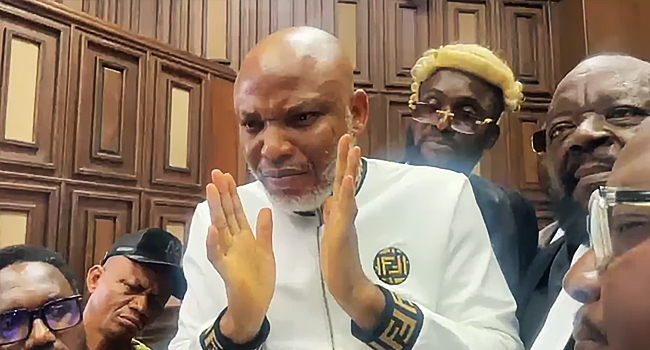ABUJA: The Federal High Court in Abuja has dismissed the no-case submission filed by the detained leader of the proscribed Indigenous People of Biafra (IPOB), Nnamdi Kanu, ruling that he must open his defence in the ongoing terrorism trial.
Delivering the ruling on Thursday, Justice Omotosho held that the Department of State Services (DSS) and the prosecution team had established a prima facie case against Kanu, warranting that he respond formally to the allegations before the court.
According to the judge, the evidence and exhibits presented were strong enough to raise serious questions about Kanu’s alleged involvement in acts of terrorism, which only his defence could properly address.
“The court cannot at this stage determine the truth or falsity of the claims. What is clear is that the prosecution has led evidence sufficient enough to warrant the defendant being called upon to defend himself,” Justice Omotosho declared.
He further noted that Kanu’s claims of extraordinary rendition—his alleged abduction and forced transfer from Kenya to Nigeria in 2021—could not be dismissed in isolation but should be ventilated by the defence as part of his constitutional right to a fair hearing.
Nnamdi Kanu, who has been at the centre of Nigeria’s secessionist agitation for an independent Biafra, is facing a seven-count charge bordering on terrorism, incitement, and unlawful broadcast.
His arrest and extraordinary rendition in June 2021 reignited debates on the Nigerian government’s handling of dissent and separatist movements.
While his supporters insist he is a political prisoner, the Federal Government has maintained that his activities, including inflammatory broadcasts, encouraged violence in the South-East.
The IPOB leader’s legal battle has dragged on for years, with multiple adjournments, bail revocations, and medical applications dominating proceedings.
Alongside the ruling, Justice Omotosho directed the President of the Nigerian Medical Association (NMA) to immediately set up a panel of eight to 10 medical practitioners to examine Kanu and determine if he is medically fit to continue standing trial.
This directive followed an application by his defence counsel, who argued that Kanu suffers from a life-threatening illness that requires urgent medical attention outside DSS custody. The defence requested that he be transferred to a private ward at the National Hospital, Abuja.
While the court acknowledged the importance of the defendant’s health, it insisted that an independent medical assessment was necessary to balance his rights with the need for an uninterrupted judicial process.
The ruling is likely to fuel further debates about the Federal Government’s handling of secessionist movements.
For many in the South-East, Kanu is viewed as a symbol of resistance against perceived marginalisation. For the government, however, he remains a destabilising figure whose rhetoric has emboldened violent attacks on security operatives and state institutions.
Legal analysts note that by ordering him to open his defence, the court has shifted the trial into a decisive phase that could determine not only Kanu’s fate but also how the judiciary balances issues of national security with constitutional rights.
Observers also point out that the court’s order for a medical panel underscores the judiciary’s caution in ensuring that human rights considerations are not swept aside in a politically charged case.
With the no-case submission dismissed, Kanu will now be required to take the witness stand or call witnesses in his defence.
His legal team is expected to challenge the admissibility of some of the evidence and may also seek to revisit arguments on his extraordinary rendition.
For now, the trial continues to test the resilience of Nigeria’s justice system, as well as the Federal Government’s broader approach to resolving separatist agitations in the South-East.



